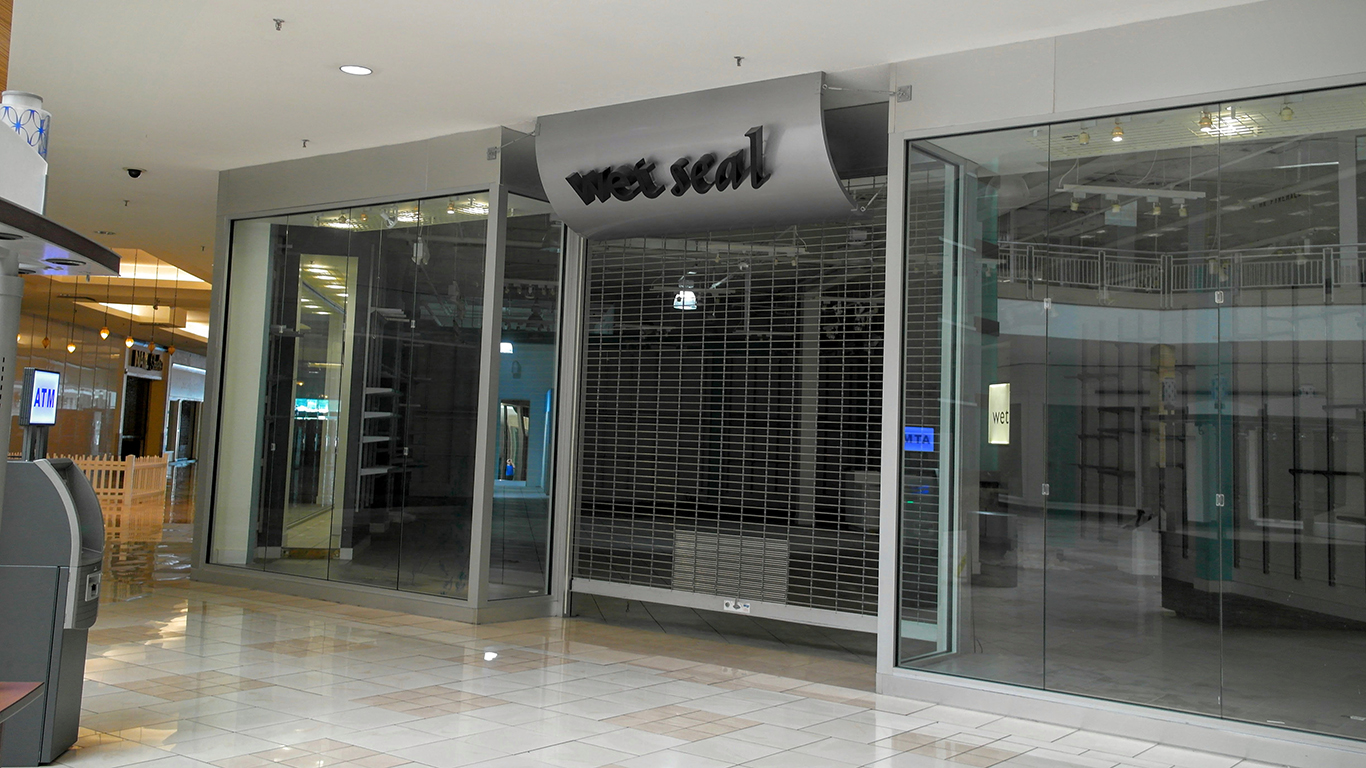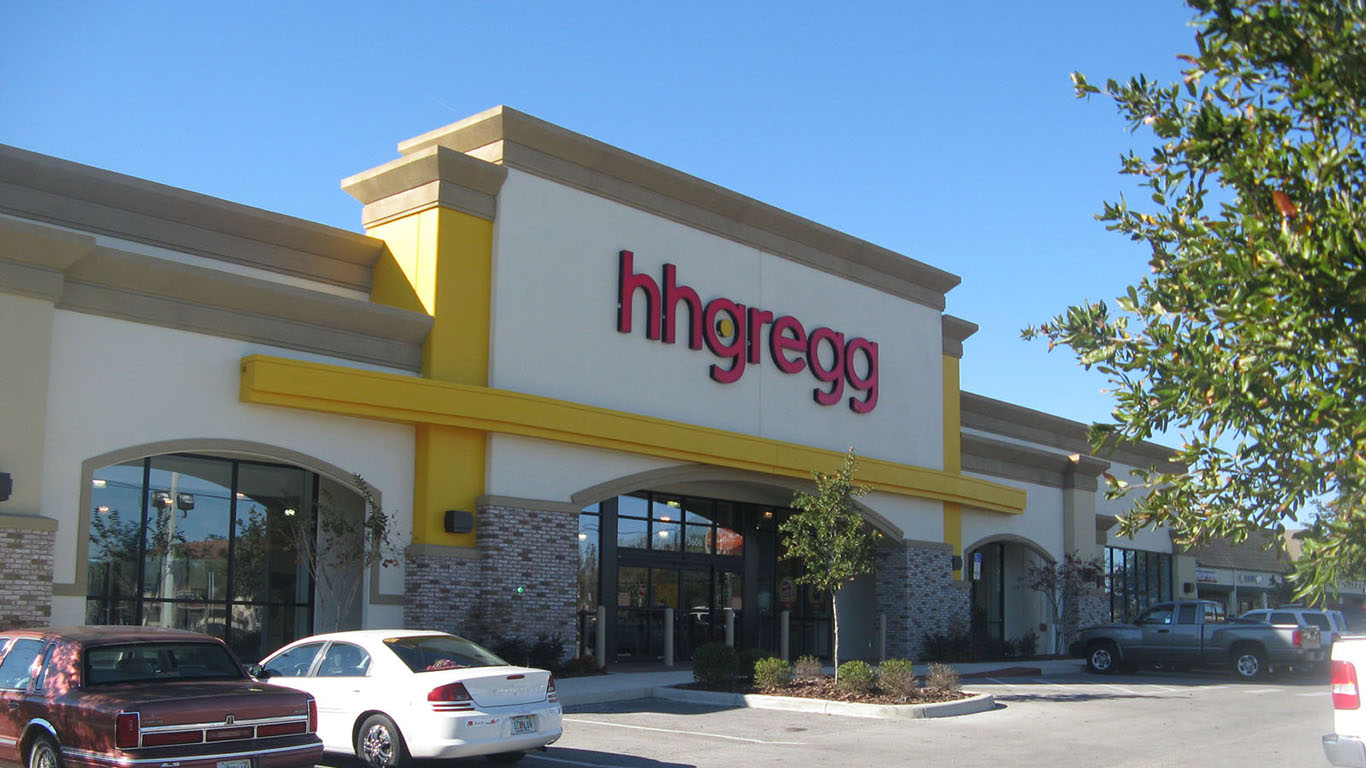Special Report
12 Companies Laying Off the Most Workers in 2017

Published:
Last Updated:

In an era of fast fashion, fast food and fast internet, the old ways of doing business just don’t cut it. As more consumers shift to online shopping and business at many brick-and-mortar retailers slows, layoffs become inevitable. According to data compiled by outplacement firm Challenger, Gray and Christmas, job cuts so far in 2017 have been retail-heavy, a phenomenon known as “retail apocalypse.”
The retail free-fall has implications for shopping centers as well. JCPenney has been an anchor tenant at malls all over the country for decades, but the discount retailer has been struggling, and real estate experts are concerned about the future of malls. According to an analysis by global financial service giant Credit Suisse, 20% to 25% of all malls are expected to close in the next five years.
While retail is bearing the brunt of job cuts this year,the energy sector posted the most layoffs through the same period in 2016. The good news is the pace of layoffs appears to be slowing. There were nearly 360,000 announced job losses by the end of July of last year. So far in 2017, there are about 255,000 announced job losses.
Technology is not just upending the retail sector. One insurance company on this list has actually lost money because of higher claims costs from car crashes as more drivers are distracted by electronic devices.
Click here to see the 12 companies that are laying off the most workers in 2017.
To identify the 12 companies that are laying off the most workers so far in 2017, 24/7 Wall St. reviewed data on job losses per month compiled by Challenger, Gray and Christmas. Job cuts announced in 2017 but which only included positions cut in 2016 were excluded from the list. Layoffs do not have to be entirely within the United States. Job cuts were confirmed from data analysis, company announcements, media reports and press releases.

12. The State Department
> 2017 layoffs announced through July: 2,300
> Number of employees: 69,000
> 1-yr share price chg.: N/A
> Industry: Government
Secretary of State Rex Tillerson has proposed cutting 2,300 diplomat and civil servant jobs worldwide, or 3% of the department’s workforce, as part of a plan to adjust the department’s budget for the next fiscal year. Tillerson’s plan would cut the budget by 26% with 600 jobs eliminated through buyouts and 1,700 from attrition. The plan is in accord with President Donald Trump’s vision of a smaller federal government and reflects conservatives’ belief that government agencies have grown too large and are straying from their core mission.
[in-text-ad]

11. Lowe’s Cos.
> 2017 layoffs announced through July: 2,400
> Number of employees: 290,000
> 1-yr share price chg.: -3.1%
> Industry: Retail
The home improvement category has been improving since the housing sector began to recover from the financial crisis. But that has provided little solace for the 2,400 workers at Lowe’s Cos. who got pink slips in February. The majority of the cuts were at the store level but affected positions at distribution centers, contact centers, and at the company’s corporate office in Mooresville, North Carolina, Lowe’s said. The announcement impacted fewer than 1% of the company’s 290,000 full-time and part-time workers.
Lowe’s has been struggling to compete with the sector leader, home improvement juggernaut Home Depot, which has boosted profitability by targeting contractors and small business. There was more disappointing news for Lowe’s on Wednesday that might presage additional job cuts. Second quarter earnings and sales fell short of analysts’ expectations.

10. The Hershey Company
> 2017 layoffs announced through July: 2,697
> Number of employees: 18,000
> 1-yr share price chg.: -6.2%
> Industry: Food
General Motors, the biggest American car company, notified 2,700 autoworkers in Venezuela by text this past April that they no longer had a job. The notice from GM to the workers followed the decision by the Venezuelan government to seize the company’s facilities. Venezuela President Nicolás Maduro said the seizure of GM’s plants is not permanent, and he is urging the automaker to come back to the South American country. GM, based in Dearborn, Michigan, said the seizure was illegal.

9. General Motors
> 2017 layoffs announced through July: 2,700
> Number of employees: 225,000
> 1-yr share price chg.: +10.2
> Industry: Automotive
General Motors, the biggest American car company, notified 2,700 autoworkers in Venezuela by text this past April that they no longer had a job. The notice from GM to the workers followed the decision by the Venezuelan government to seize the company’s facilities. Venezuelan President Nicolás Maduro said the seizure of GM’s plants is not permanent and is urging the automaker to come back to the South American country. GM, based in Dearborn, Michigan, said the seizure was illegal.
[in-text-ad]

8. Dollar Express
> 2017 layoffs announced through July: 2,800
> Number of employees: 0
> 1-yr share price chg.: N/A
> Industry: Retail
Dollar Express, created in July 2015 as a result of the sale of some 330 Family Dollar stores to private equity firm Sycamore Partners, struggled to remain viable. In mid-April, after Sycamore said Dollar Express “can no longer operate as a viable standalone business,” the Federal Trade Commission (FTC) approved the sale of all 323 Dollar Express stores to Tennessee-based Dollar General. The FTC stated that about 3,000 employees in 36 states would be affected, including 110 in the new Charlotte corporate office.

7. Weatherford International
> 2017 layoffs announced through July: 3,000
> Number of employees: 39,500
> 1-yr share price chg.: -33.1
> Industry: Energy
Oil and natural gas extraction technology company Weatherford International said in February that it planned to slash 3,000 jobs worldwide as part of its cost-cutting efforts. Further streamlining its operations, the company also announced it planned to sell selling its hydraulic fracturing business and its Middle East drilling rig division. The layoffs came after the Houston, Texas-based company cut 9,000 jobs in 2016.

The teenage surf-and-sun style retailer did not escape its death spiral. Wet Seal, which closed 171 stores and cut 3,000 jobs across 42 states in 2017, had filed for bankruptcy in 2015 after losing $113 million in 2013. Analysts concluded that falling foot traffic at shopping malls played a major role in the company’s demise. In March, a U.S. Bankruptcy Court judge signed off on $3 million Gordon Brothers’ purchase of Wet Seal’s intellectual property, brands, and trademark.
[in-text-ad]

5. The Limited
> 2017 layoffs announced through July: 4,000
> Number of employees: 0
> 1-yr share price chg.: N/A
> Industry: Retail
The post-holiday shopping period usually brings with it announcements of store closings and layoffs, and the 54-year-old women’s apparel chain The Limited fits the pattern. The Limited announced in January it was closing all 250 of its stores, another casualty of online shopping preferences. The closures resulted in 4,000 employees losing their jobs. The Columbus, Ohio-based mall mainstay, owned by private equity group Sun Capital, said on its website that it would continue to do business online. The store was founded by Leslie H. Wexner and got its name from selling a limited assortment of women’s apparel.

4. State Farm
> 2017 layoffs announced through July: 4,200
> Number of employees: 70,000
> 1-yr share price chg.: N/A
> Industry: Insurance
America’s largest home and auto insurer State Farm plans to shut 11 U.S. facilities and lay off 4,200 employees after posting a $7 billion annual underwriting loss on auto policies in 2016. Several insurers, including State Farm, have reported higher claims due to crashes resulting from electronic devices distracting drivers.The company said employees in affected facilities will have opportunities at other State Farm locations.

3. HHGregg
> 2017 layoffs announced through July: 5,000
> Number of employees: 0
> 1-yr share price chg.: -99.5
> Industry: Retail
Indianapolis-based electronics and appliance retailer HHGregg closed all 220 of its stores in April, one month after filing for bankruptcy protection. The company said it had discussions with 50 private-equity groups and investors, but it failed to find a buyer. HHGregg, like so many retailers, did not adapt quickly enough to changing shopper habits such as shopping online. The company became overstored and overstocked.
[in-text-ad]

2. JC Penney
> 2017 layoffs announced through July: 5,500
> Number of employees: 106,000
> 1-yr share price chg.: -64.1
> Industry: Retail
J.C. Penney has been swinging the axe often in recent years. In February, the Plano, Texas-based discount retailer announced its latest round of job cuts, saying it planned to shutter up to 140 stores and laying off 5,500 employees.
Explaining the measures, Chief Executive Officer Marvin Ellison said in a statement, “We believe closing stores will also allow us to adjust our business to effectively compete against the growing threat of online retailers.’’

1. Macy’s
> 2017 layoffs announced through July: 10,000
> Number of employees: 158,000
> 1-yr share price chg.: -48.9
> Industry: Retail
Macy’s, the venerable department store chain that traces its roots to the 19th century, began the new year by announcing it was closing 68 stores and laying off 10,000 workers. Macy’s made the announcement on Jan. 4, and the company’s stock plunged 10% in after-hours trading.
Like many brick-and-mortar retailers, Macy’s has been slow to adjust to the online commerce world. The company has taken steps to address this. In making its layoff announcement, Cincinnati-based Macy said it would use the savings from store closures and layoffs to invest in its digital business. On Aug. 22, Macy announced that it hired Hal Lawton, a former executive at online auction site eBay, as president. The task of reversing Macy’s fortunes is daunting; net income for the fiscal first quarter ended April 29 fell 39% to $70 million from $115 million the same period in the previous year.
Credit card companies are at war. The biggest issuers are handing out free rewards and benefits to win the best customers.
It’s possible to find cards paying unlimited 1.5%, 2%, and even more today. That’s free money for qualified borrowers, and the type of thing that would be crazy to pass up. Those rewards can add up to thousands of dollars every year in free money, and include other benefits as well.
We’ve assembled some of the best credit cards for users today. Don’t miss these offers because they won’t be this good forever.
Flywheel Publishing has partnered with CardRatings for our coverage of credit card products. Flywheel Publishing and CardRatings may receive a commission from card issuers.
Thank you for reading! Have some feedback for us?
Contact the 24/7 Wall St. editorial team.